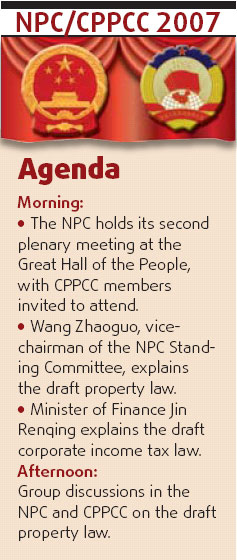Energy use 'no threat' to the world
By Li Fangchao (China Daily)Updated: 2007-03-08 06:55
Don't see China's development as an energy threat to the world because not only is its per capita consumption very small, but also it's working hard to save energy, the country's top planner Ma Kai said yesterday.
It's true that China is the second largest consumer of
crude oil in the world. But then it's home to one-fifth of the world's
population and a rapidly growing economy, the minister of the National
Development and Reform Commission (NDRC) said at a press conference during the
current session of the National People's Congress (NPC) in Beijing. 
China's per capita oil import is just about 100 kilograms a fraction of the United States and Japan. Moreover, Ma said, more than 90 percent of China's energy is produced domestically, a rate higher than many countries.
The fact is China is contributing to global energy security by trying to become self-reliant in energy, he said.
The top planning official asserted that China was capable of meeting its energy demand by continuing to rely on its own rich coal, oil and natural gas reserves.
Reassuring those worried over greenhouse effect and global warming, Ma said the country had a huge potential for clean energy, too, such as generating power from water, wind and the sun.
 He promised that despite all difficulties, China would meet its goal of
cutting down energy use per unit of GDP by 20 percent, and reducing key
pollutants by 10 percent during the 11th Five-Year Plan (2006-10).
He promised that despite all difficulties, China would meet its goal of
cutting down energy use per unit of GDP by 20 percent, and reducing key
pollutants by 10 percent during the 11th Five-Year Plan (2006-10).
The government will report China's energy conservation and pollution control results to the NPC every year, though the country flunked its first test last year.
The Government Work Report presented by Premier Wen Jiabao to the NPC on Monday blamed the traditional economic growth model, based on massive energy consumption and low efficiency and heavy pollution, for the failure. The unchecked GDP growth, 2-3 percent higher than the projected figures, in recent years was also the cause of the failure.
"How can we expect to drastically slash energy consumption without reining in the GDP growth?" said Wang Jirong, a member of the National Committee of the Chinese People's Political Consultative Conference (CPPCC) and former deputy minister of the State Environmental Protection Administration (SEPA).
"It wouldn't be scientific to set each year's reduction target by simply dividing 20 by 5," she said.
Despite growing public attention on environmental issues, people still could do a lot to reduce pollution, Wang said.
A vital thing for the government to do would be to reduce the importance of economic achievements in local officials' performance appraisal, she said. That could stop the race among provinces and municipalities to outdo each other.
(China Daily 03/08/2007 page1)
|
||
|
||
|
|